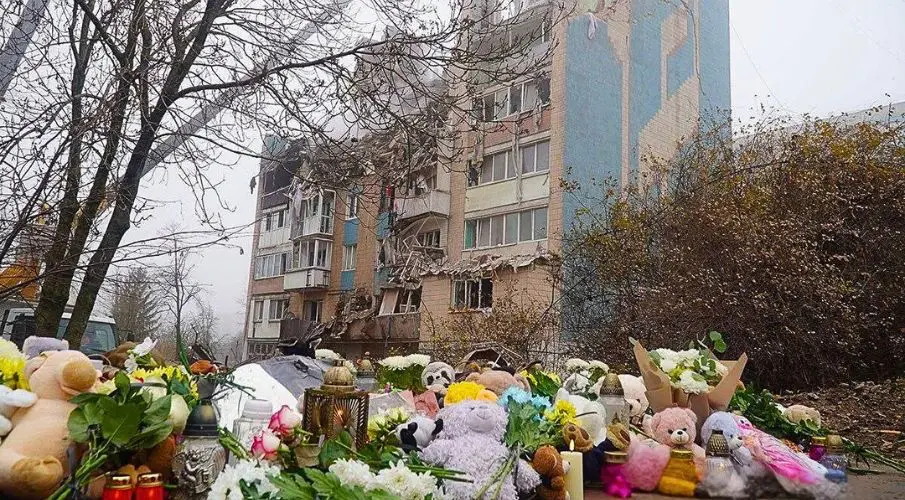Trump announces that his peace plan has been "fine-tuned" and sends two trusted envoys on their way: Steve Witkoff is to go to Moscow, Dan Driscoll is to speak with Ukraine. He himself wants to appear only when everything is "final", as he writes. The message is clear: he sees himself as the final act, not the mediator. But while Washington builds this image, Kyiv shows how thin the foundation of these announcements really is. Hours after Driscoll sat with Russian representatives in Abu Dhabi, rockets hit the capital. At least seven people were killed, twenty were injured, residential buildings were in flames. City officials said it had been a night that instantly destroyed any thought of relief.

The attack came at a moment when Trump is trying to rescue his agreement from growing doubts in Europe. His plan originally consisted of 28 points that gave Russia far more than Ukraine. After Geneva, the document was shortened, parts were adjusted, and Kyiv emphasized that at least a few common points had been found. But Moscow immediately dampens any public optimism. Foreign Minister Sergey Lavrov says Russia is waiting for an "interim version" and suggests that any deviation from the meeting in Anchorage, where Trump clearly aligned with the Russian approach, would put the talks "in a fundamentally different situation". It is a hint no one needs translated: Moscow expects a deal on its terms.
Meanwhile, European states are conferring by video because they were excluded from the initial drafts. French President Macron stresses that decisions affecting Europe and NATO must be coordinated with all partners. He calls it a chance for progress, but only if Ukraine receives robust security guarantees. Paper alone, he says, has never been enough, not after all the years in which Russia breaks agreements whenever it suits its interests. In Kyiv, people feel the consequences of this situation directly. Underground parking garages are once again turning into shelter spaces. In cafés, residents talk about how familiar this sequence has become: a diplomatic initiative, followed by an attack that buries every hope in rubble. Some openly say they fear Washington could push Ukraine toward a solution the country would pay for dearly. A member of Parliament from the opposition Holos party says, "Even for a bad peace, you should not issue an ultimatum to the victim. You need to put pressure on the aggressor."
But despite all the skepticism, many desperately want the war to end. Zelensky announces that he is ready to travel to the United States as soon as a joint text is finalized. His security adviser emphasizes that Geneva produced "a common understanding of the central points". But he also notes that nothing has been agreed yet. While diplomats talk, Russia continues: attacks on Odesa, Dnipro, Kharkiv, Chernihiv, Cherkasy. Zelensky says the primary targets are energy infrastructure and everything that keeps daily life functioning. At the same time, Ukraine launches its own strikes on Russian territory, including in Krasnodar and Rostov, where several people were killed.
The war presses into every sentence of these negotiations. It allows no pause, no moment for political staging. While Trump sends his envoys around the world and announces that he will appear only when the "final deal" is ready, the situation in Ukraine shows a different truth: reality does not follow the schedule of the White House. It follows the impact of the next rocket.
Investigative journalism requires courage – and your support.
Help sustain our reporting and our work. Even a small contribution helps us continue every day. Kaizen operates without ads, without subscriptions, without corporations, without political parties.
Independent – Critical – For Everyone
Thank you for making independent journalism possible.
Updates – Kaizen News Brief
All current curated daily updates can be found in the Kaizen News Brief.
To the Kaizen News Brief In English
Bestimmt zum Beluga-Kaviar-Essen.
…den wird es bestimmt geben
Es ist schrecklich, wie sich durch Trump die Ohnmacht in Europa breit macht. Jetzt rächt sich, dass der Westen keine ernstzunehmende Großmacht mehr hinter sich hat. Keiner weiß, was Putin mit Trump klüngelt. Arme Ugraine!
da haben sie recht, das hätte vor 10 jahren noch keiner geglaubt, wie das alles eskaliert ist und auch trump so abdriftet
Für Trump zählt „Stärke“ und somit die Macht des Stärkeren.
Dazu kommt, dass Putin Trump sicher mit etwas in der Hand hat.
Ob nun ein 28 Punkte Plan direkt aus russischer Hand oder 19 Punkte Plan mit „Feinjustierung“ den Russland gleich ablehnt.
Weder Europa, weil sie einfach nicht in die Gänge kommen, noch die Ukraine haben ein echtes Mitspracherecht.
Entweder die Ukraine unterwirft sich und Russland bricht, wie schon 2914 nach der Krim, sein Wort und greift erneut an.
Oder die Ukraine kämpft so lange es geht, brennt im Zweifel ihr eigenes Land nieder und eine der größten europäischen Flüchtlingswellen entsteht.
Dazwischen sehe ich mit Trump und Putin, aber auch Xi und „wir beraten“ EU nichts.